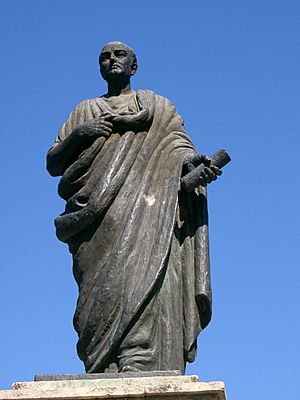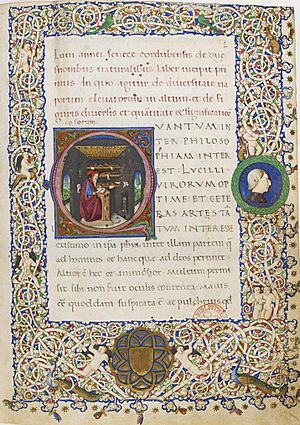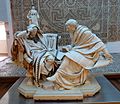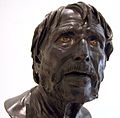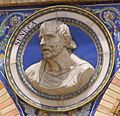Seneca the Younger facts for kids
Quick facts for kids
Seneca the Younger
|
|
|---|---|
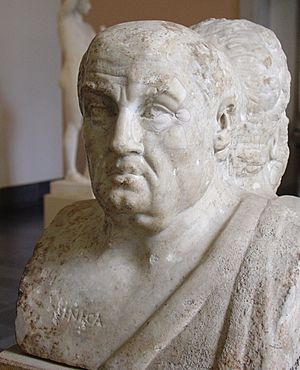
Ancient bust of Seneca, part of the Double Herm of Socrates and Seneca
|
|
| Born | c. 4 BC Córdoba, Hispania Baetica (present-day Spain)
|
| Died | AD 65 (aged 68–69) |
| Nationality | Roman |
| Other names | Seneca the Younger, Seneca |
|
Notable work
|
Epistulae Morales ad Lucilium |
| Era | Hellenistic philosophy |
| Region | Western philosophy |
| School | Stoicism |
|
Main interests
|
Ethics |
|
Notable ideas
|
Problem of evil |
|
Influences
|
|
|
Influenced
|
|
Lucius Annaeus Seneca the Younger ( c. 4 BC – 65 AD), usually known mononymously as Seneca, was a Stoic philosopher of Ancient Rome, a statesman, dramatist, and, in one work, satirist, from the post-Augustan age of Latin literature.
Contents
Biography
Seneca was born in Córdoba in the Roman province of Baetica in Hispania. He was raised in Rome. Seneca was taught the usual subjects of literature, grammar, and rhetoric, as part of the standard education of high-born Romans.
His father was Seneca the Elder, his elder brother was Lucius Junius Gallio Annaeanus, and his nephew was the poet Lucan.
In AD 41, Seneca was exiled to the island of Corsica under emperor Claudius, but was allowed to return in 49 to become a tutor to Nero. When Nero became emperor in 54, Seneca became his advisor. Together with the praetorian prefect Sextus Afranius Burrus, provided competent government for the first five years of Nero's reign.
After Burrus's death in 62, Seneca's influence declined rapidly. He tried to retire twice, in 62 and 64 AD, but Nero refused him on both occasions. Nevertheless, Seneca took absence from the court and led a quiet life in his country estates. He concentrated on his studies and seldom visited Rome. It was during these final few years that he composed two of his greatest works: Naturales quaestiones—an encyclopedia of the natural world; and his Letters to Lucilius—which document his philosophical thoughts.
In 65 Seneca was forced to take his own life for alleged complicity in the Pisonian conspiracy to assassinate Nero, in which he was probably innocent. Seneca obeyed his Emperor's order.
Personal life
A few weeks before his exile, Seneca's only son died. Later in life Seneca was married to a woman younger than himself, Pompeia Paulina.
Philosophy
Seneca has been described as “a towering and controversial figure of antiquity” and “the world’s most interesting Stoic”.
Seneca wrote a number of books on Stoicism, mostly on ethics. His moral essays are based on Stoic doctrines. Stoicism was a popular philosophy in this period, and many upper-class Romans found in it a guiding ethical framework for political involvement.
Seneca regards philosophy as a balm for the wounds of life. The destructive passions, especially anger and grief, must be uprooted, or moderated. One must be willing to practice poverty and use wealth properly, and he writes about favours, clemency, the importance of friendship, and the need to benefit others. The universe is governed for the better by providence, so one must accept whatever comes his way.
He also believes it is important to recognize one's own mortality and to be able to face death without fear.
Works
As a writer, Seneca is known for his philosophical works, and for his plays, which are all tragedies. His prose works include 12 essays and 124 letters dealing with moral issues. These writings constitute one of the most important collections of primary material for ancient Stoicism. As a tragedian, he is best known for plays such as his Medea, Thyestes, and Phaedra.
Legacy
Seneca's influence on later generations is immense—during the Renaissance he was "a sage admired and venerated as an oracle of moral, even of Christian edification; a master of literary style and a model [for] dramatic art."
Interesting facts about Seneca
- Seneca often had breathing difficulties throughout his life, probably asthma.
- At some point in his mid-twenties (c. 20 AD) he appears to have been struck down with tuberculosis.
- He lived in Egypt with his aunt for about 10 years.
- Seneca was first ordered to take his own life by Emperor Caligula who got offended by Seneca's oratorical success in the Senate. Seneca survived only because he was seriously ill and Caligula was told that he would soon die anyway.
Seneca quotes
- “All cruelty springs from weakness.”
- “Difficulties strengthen the mind, as labor does the body.”
- “As is a tale, so is life: not how long it is, but how good it is, is what matters.”
- “If a man knows not to which port he sails, no wind is favorable.”
- “It is the power of the mind to be unconquerable.”
- “Associate with people who are likely to improve you.”
- “Only time can heal what reason cannot.”
Images for kids
-
Nero and Seneca, by Eduardo Barrón (1904). Museo del Prado
-
The "Pseudo-Seneca", a Roman bust found at Herculaneum, one of a series of similar sculptures known since the Renaissance, once identified as Seneca. Now commonly identified as Hesiod
-
Baroque marble imaginary portrait bust of Seneca, by an anonymous sculptor of the 17th century. Museo del Prado
See also
 In Spanish: Séneca para niños
In Spanish: Séneca para niños


